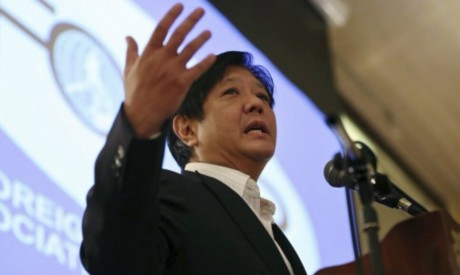
It was a fine battle of brains and wit the likes of which had not been seen in Philippine politics for years! But it was not a battle amongst equals. As my colleague Ilda had earlier pointed out, vice presidential candidate Bongbong Marcos was a clear standout in last night’s vice presidents’ debate (dubbed #PiliPinasDebates2016) hosted by CNN Philippines.
Marcos was a standout because he exhibited remarkable grace and dignity fending off the infantile loaded questions flung at him by the other candidates, notably Chiz Escudero, Alan Peter Cayetano, and the trailer amongst the majors, Liberal Party candidate Leni Robredo. The accusations and zingers issued by these three against Marcos were nothing new. Even hakot “activists” dragged straight out of their Grade 1 class and onto various street rallies have for years been parroting the trite anti-Marcos drivel delivered by Escudero, Cayetano, and Robredo on national television.
The candidates were, of course, playing to the balasubas Filipino audience. This is, after all, a Philippine election — essentially a popularity contest. And to be popular in the Philippines, you need to pander to mass audience tastes. Filipino tastes and manners were all on exhibit on Sunday, the 10th of April. Listening to the hoots, jeers, and screams of the audience, you’d think you were watching a cock fight. In such a crowd, simply mouthing a familiar slogan will rouse the audience. That, essentially, is what the vice presidential candidates did throughout the night. They were not really addressing one another, they were addressing the audience. When you are a hammer, everything you see is a nail. When you are a politician everyone is a voter.
Marcos is, of course, a politician. But unlike his rivals who stooped to the masa and assumed that position permanently, Marcos struck a fine messaging balance during the debate. Like an excellent episode of Sesame Street or Spongebob Square Pants, Bongbong delivered finely-crafted soundbytes that were exquisitely-multiplexed to appeal to both educated and uneducated, young and old, rich and poor, urbane and bakya. In short, what came out of his mouth was a multi-channeled orchestra of ideas that appealed to all levels of audience sophistication.
This is true statesmanship. Real statesmen address entire nations.
Compare this to current President Benigno Simeon ‘BS’ Aquino III and his sidekick Mar Roxas with their tired and exceedingly annoying habitual use of Tagalog peppered with street lingo like “eh di wow” and the like. The reason the Philippines remains a blight on the intellectual landscape of southeast Asia is beause of “leaders” like these — rather than seek to uplift their people’s political discourse, they’d rather pander to their low-class humour and addiction to slapstick entertainment.
It is therefore no wonder that Bongbong Marcos resonates the strongest amongst the A, B, and C crowds — because he represents class and dignity. Perhaps this is something all Filipinos who aspire to be looked up to by their barrios and spend afternoons sipping lattes at Starbucks and rubbing elbows with the peninsulares at Glorietta should take note of. You don’t climb the Philippines’ social ladder by acting like buffoons — something politicians like Aquino, Roxas, Escudero, Cayetano, and Robredo have branded themselves around. Ask no less than boxing champ Manny Pacquiao whose vast wealth was virtually useless in his efforts to gain membership in the Manila Polo Club.
The Philippines’ financial impoverishment is but a mere symptom of its more profound social and cultural impoverishment. Because Filipinos routinely fail in their civic duty to conduct themselves with grace and dignity and exhibit basic courtesies to one another, they have woven a foundation of dysfunction into the very fabric of their society — one where distrust and envy reign instead of mutual support and collaboration.
Perhaps the grace Bongbong Marcos has shown during these debates, more than anything else, could serve as a reminder of the subtle leadership qualities and the nature of world-class statesmanship that Filipinos had somehow lost in the last 30 years. Since 1986, Yellow thinking had all but convinced an entire generation of Filipinos that being crass and stupid were virtues to be aspired to. It is time we change that squatter mentality culture and look to leadership that we could truly be proud of.
No comments:
Post a Comment